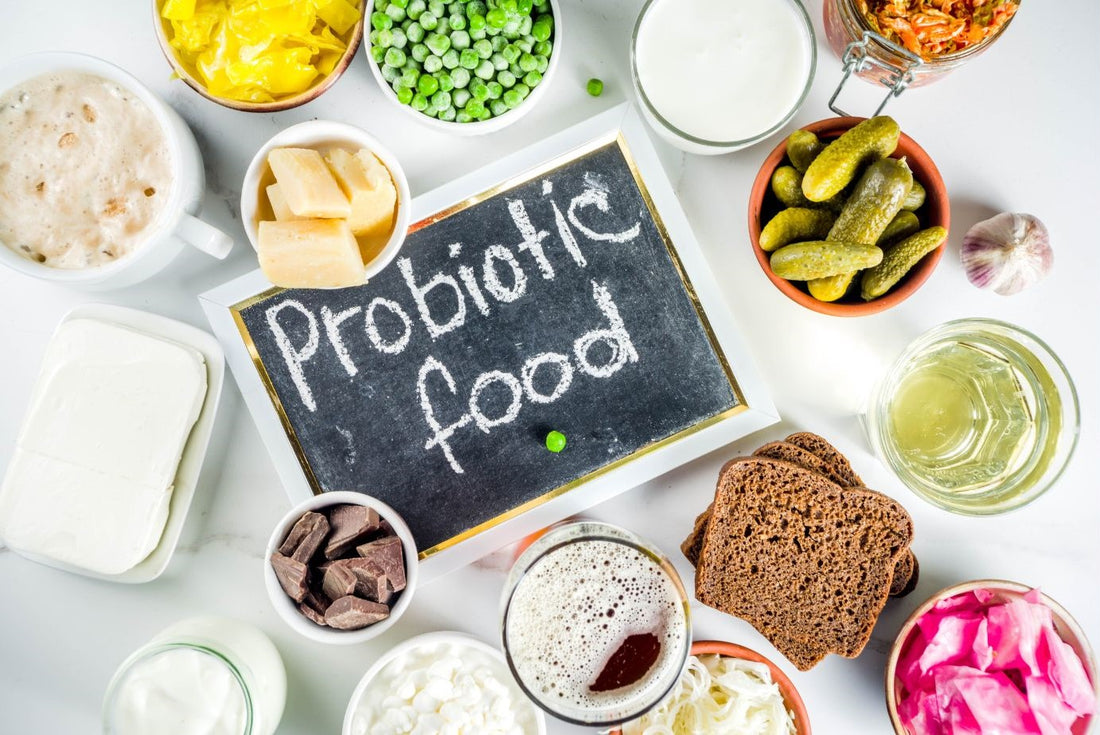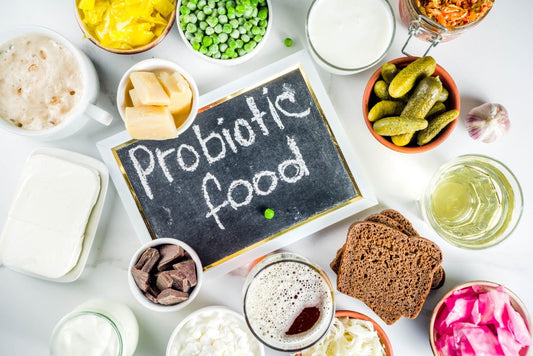20 Natural Sources of Probiotics
Natural foods like yogurt, kefir (fermented milk), sauerkraut (fermented cabbage), kimchi (fermented vegetables), miso (fermented soybean paste), tempeh (fermented soybeans), and pickles are some of the best sources of natural probiotics. These meals are teeming with dietary sources of probiotics that guide digestive fitness and immunity.

1. Yogurt:
One of the famous natural foods that contain probiotics, yogurt incorporates stay cultures of useful microorganisms along with Lactobacillus and Bifidobacterium.
2. Kefir:
A fermented milk drink much like yogurt, kefir is a natural source of probiotics and additionally gives a great supply of calcium and protein.
3. Sauerkraut:
Fermented cabbage is excessive in probiotics, sauerkraut is likewise wealthy in nutrients C, K, and diverse antioxidants.
4. Kimchi:
A conventional Korean dish crafted from fermented greens, on the whole cabbage and radishes, kimchi is a powerful supply of probiotics.
5. Miso:
A Japanese seasoning crafted from fermented soybeans, miso is also one of the natural foods that contain probiotics and provide a unique taste to dishes.
6. Tempeh:
A fermented soybean product originating from Indonesia, tempeh is wealthy in probiotics and protein.
7. Kombucha:
A fizzy, fermented tea drink, kombucha incorporates quite a few probiotics and is likewise wealthy in antioxidants.
8. Pickles:
Fermented cucumbers and pickles are a delectable and crunchy supply of probiotics.
9. Traditional Buttermilk:Not to be stressed with cultured buttermilk, conventional buttermilk is a fermented dairy product foods that are good source of probiotics.
10. Natto:
A conventional Japanese dish crafted from fermented soybeans, natto is a powerful supply of probiotics and nutrition K2.
11. Kvass:
A fermented beverage originating from Eastern Europe, kvass is generally crafted from rye bread and is rich in probiotics.
12. Lassi:
A conventional Indian yogurt-based drink, lassi is regularly flavored with results or spices and natural foods that contain probiotics.
13. Fermented Cheese:
Certain sorts of cheese, along with Gouda, cheddar, and Swiss, go through fermentation and include probiotics.
14. Sourdough Bread:
Made by the fermentation of dough with the use of wild yeast and lactic acid microorganisms, sourdough bread is one of the best sources of natural probiotics.
15. Traditional Ethiopian Injera:
A sourdough flatbread crafted from teff flour, injera is fermented and is among the foods rich in probiotics.
16. Traditional Turkish Ayran:
A yogurt-based beverage, Ayran is one of the foods that are good sources of probiotics and is regularly eaten as a clean drink.
17. Fermented Vegetables:
Besides sauerkraut and kimchi, different fermented greens like pickled carrots, beets, and peppers additionally offer probiotics.
18. Fermented Soy Products:
Apart from tempeh and miso, fermented soy merchandise like soy sauce and soybean paste are assets of probiotics.
19. Coconut Kefir:
Made from fermented coconut water, coconut kefir is a dairy-loose opportunity natural foods that contain probiotics.
20. Fermented Grains:
Fermented grains along with sourdough, fermented rice, and fermented oats also can include probiotics.
Health Benefits of Natural Probiotics
Consuming dietary sources of probiotics gives a plethora of fitness benefits, including:Improved Digestive Health:
Probiotics assist in maintaining the healthful stability of intestine organisms, which aids in digestion and can alleviate signs and symptoms of digestive issues consisting of irritable bowel syndrome (IBS) and inflammatory bowel disease (IBD).

Boosted Immune System:
The intestine is intricately related to the immune system, and probiotics can decorate immune characteristics by selling the manufacturing of antibodies and boosting the interest of immune cells.
Enhanced Nutrient Absorption:
By enhancing digestion and intestine fitness, probiotics may also decorate the absorption of vitamins from food, making sure that your frame gets crucial nutrients and minerals.
Reduced Risk of Infections:
Probiotics compete with dangerous microorganisms for sources inside the intestine, thereby decreasing the chance of infections and selling universal intestine fitness.
Mental Health Benefits:
Emerging studies show that the intestine-mind axis performs a critical position in intellectual fitness, and probiotics may also assist in alleviating signs and symptoms of anxiety, depression, and stress.

Conclusion
Harnessing the power of natural foods high in probiotics by incorporating them into your diet is a simple yet impactful way to support gut health and overall well-being. From yogurt and sauerkraut to tempeh and kombucha, there's a diverse array of delicious and nutritious options to choose from. To experience the myriad benefits of probiotics firsthand, start by adding these natural sources to your meals regularly. Take charge of your gut health today and embark on a journey towards a happier, healthier you. Begin by adding foods rich in probiotics to your shopping list and discover the transformative effects they can have on your well-being. Try Good Monk’s nutrition health mix for family. Your gut will thank you for it!








![10 Recommended Vitamin B9 Foods [Folic Acid/Folate] for 2024](http://www.goodmonk.in/cdn/shop/articles/10_Recommended_Vitamin_B9_Foods_Folic_AcidFolate_for_2024_3.jpg?v=1712230660&width=533)

